PRESERVING A MILITARY LEGACY FOR FUTURE GENERATIONS
The following Reflections represents SSGT Walter Rivera’s legacy of his military service from 1981 to 1997. If you are a Veteran, consider preserving a record of your own military service, including your memories and photographs, on Togetherweserved.com (TWS), the leading archive of living military history. The following Service Reflections is an easy-to-complete self-interview, located on your TWS Military Service Page, which enables you to remember key people and events from your military service and the impact they made on your life. Start recording your own Military Memories HERE.
Please describe who or what influenced your decision to join the Marine Corps.
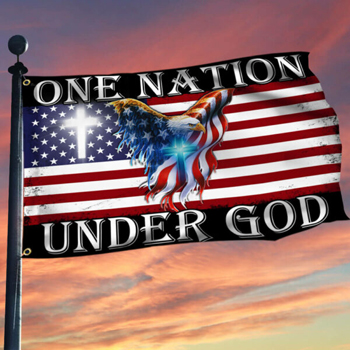
I come from a military family on both sides-mom & dad. Uncles that served in the Navy [Korea], Army [Vietnam]; 3 cousins in the Navy [Cold War], Army Nat’l Guard [Cold War], Army [GWOT]. My God-Mothers son is a Marine Veteran [Vietnam era], and my dad went to Army boot camp but got seriously injured; he couldn’t finish. In high school, I joined the Marine J.R.O.T.C. Program. For me, it was a natural thing to do. I actually joined USMC at age 9. I believed it was my destiny-to serve in the military of the greatest country on the face of the earth!
By the time I reached the 5th grade and into the 6th grade, I had read World Book Encyclopedia from AZ (with the help of Mr. James Hickey, my 5th-grade teacher), who taught us to do something we’d never done before, and I did!
As I read the Services world book, I’d stop at the Marine pages and read over and over the same article, over and over then again. Yes, I did read the other Services articles, but when I saw my God-Mothers’s son in uniform, that cemented my decision at nine years old!
In the 11th grade, I signed the Delay Entry Program and waited the whole school year to join, and the rest is history.
Whether you were in the service for several years or as a career, please describe the direction or path you took. What was your reason for leaving?
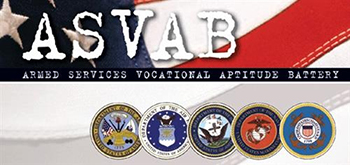
I initially joined for the jet engine mechanic AFSC, took the ASVAB, scored very high, and there I go. However, at the last minute, the week before going to boot camp, my recruiter lost all my paperwork, including my ASVAB scores; I was so pissed! I had no choice but to retake the ASVAB; my parents had to sign the documents because I was still in H.S. I retook the ASVAB but did not do as well as I did the first time, so I ended up in the infantry, which is ok by me. Still, I wanted a follow-on career after the Marine Corps; that was my other dream to be a jet engine mechanic.
The reason for leaving was that I didn’t want to leave. I was involuntarily separated at 15 years, six months, and ten days and that story is very painful to relive!
If you participated in any military operations, including combat, humanitarian, and peacekeeping operations, please describe those which made a lasting impact on you and, if life-changing, in what way?
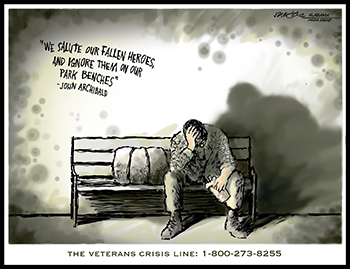
I never went to combat; that was pretty much robbed from us in one of my units during the Grenada / Beirut time frame. Rumors were flying everywhere, but the orders not to go came from 2nd MarDiv.
I did lead live combat patrols in Guantanamo Bay, I was shot at [me and my tower sentry], and I did lock and load on the enemy-Cuban soldiers during my tour of duty there on multiple occasions with my squad at the time. This event and a series of other heart-wrenching, gut-wrenching events caused P.T.S.D. I was diagnosed way later, ten years after I was out of the service, and I didn’t even know I had it.
Life after the service was extremely hard; episodes of homelessness, I was suicidal, and I didn’t know what to do next. I was stuck in a rut and lost; I got divorced, making it even worse. Twenty-two years later,[1997] till now 2019, I’m still in counseling!
Did you encounter any situation during your military service when you believed there was a possibility you might not survive? If so, please describe what happened and what was the outcome.
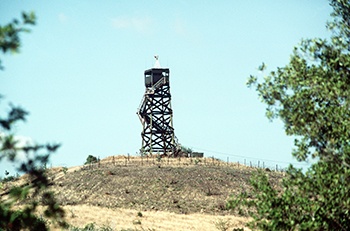
Yes, as I mentioned in the last question. I got shot at the height of the Cold War, and proud to say it, when I was sergeant of the Guard GTMO, I was inspecting my tower at the Northeast Gate when suddenly this “Fffff” sounding object and after-shock whizz passed between my sentry and me. I know the noise of this particular bullet because I had fired it to get familiar with our enemies’ weapons and know it was an AK-47 round! No doubt about it, bees make a buzzing sound-this was no bee!!! Ended up years later with PTSD.
Again as SOG and inspecting my AOR due to constant advisories of possible enemy infiltrations, as I was driving my HUM=V, I came across an area I’d never been before. The gravel on the hill’s road (downslope) was very loose; I barely had any traction and lost control of my vehicle. With both feet on the brakes, my HUM – V finally stopped on the embankment of the minefield, tangling the concertina wire to the front end of the vehicle! I barely survived this one!
Got caught in a riptide in Rio, UNITAS 93, made it out alive-exhausted, but glad to live to tell the tale, attacked by killer bees deployed to Paraguay-UNITAS 93, the front leading Amtrack whipped a killer bee nest, and all hell broke loose. Made it out alive, but the Marine on the Cmdr’s cupula had tens of stings on his face and body!
Of all your duty stations or assignments, which one do you have fondest memories of and why? Which was your least favorite?
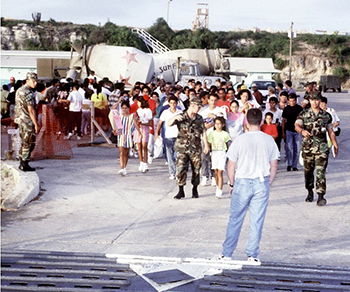
That would have to be Migrants Operations JTF 160, Guantanamo Bay, Cuba [1995]. I worked with a great Marine partner, and the Army was my chain of command. After 18 months or so for most Cuban Migrants, they had been cleared by [then] Immigration and Naturalization Service-I.N.S., the Dept. of Justice, the Community Relations Service-CRS whose [some] members were migrants at one time themselves – [Maria Exodus-1982/3]. S/Sgt. Shropshire and I jobs were to board them on a chartered plane bound for Miami to link up with family there.
JTF 160’s job was to provide security, administration, badges, food, and water, among a myriad of other tasks and services. CRS provides comfort and hands-on in easing the harsh condition of the camps, counseling, and disseminating information detrimental to the families and their future. Shrop and I were a liaison with DOJ, CRS, INS, etc. No two days were ever the same, which made it worthwhile working for JTF. To see the smiles on their faces while boarding the plane: Monday thru Saturday, two flights per day. Some would shout “FREEDOM” “Libertad” – Spanish for Liberty!
Least fav. My tour of duty with 2/6, and I’ll leave it at that, towards the end of my military career.
From your entire military service, describe any memories you still reflect on to this day.
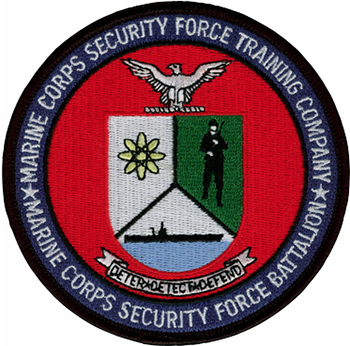
Being a Plt. Sgt. [2 infantry platoons and one H & S platoon]. How it was my job to build unit cohesion with Marines from all walks of life: Southerners, Northerners, east coast / west coast, boys coming out of farms, big cities, the Bayou, even other countries, Cuban, Russian or Ukrainian, Black, white, ‘blue,’ ‘purple’ it didn’t matter, etc., etc. The only truly authentic colors are light green and dark green. It was fascinating to watch them train, live together, do tactics, fire weapons, interact, and go on deployments together.
Rewarding them with tangibles like medals and certificates for a job well done was the other fun factor; seeing them get promoted, which was a huge deal; leaving the junior ranks to become small unit leaders-that was awesome!
Hammering them was not fun at all but was part of the job.
I have worked in the VA hospital in the Bronx, [New York] for 14 years so far. I’ve come across former platoon members here. I couldn’t even believe it; some of them get medically treated here-WOW of all places in the world!
What professional achievements are you most proud of from your military career?
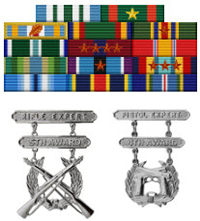
S/Sgt. Shropshire and I earned the JSCM for JTF 160, and I’m very proud of that.
I’m proud to have worn the N/MC achievement medal-2x?one for a Police Sgt. billet with MCSF Training Ctr. Now Training Co. sided with Audio-Visual section and being responsible to the C.O. for $1.5 mil in US Gov’t property and assets with 100% accuracy in audits/inspections for two straight years and designated as The Color Sergeant of the Unit (Guidon Bearer) – the senior Sgt. of the unit just like 8th and I Color Guard.
The other is my NAM for saving the life of a Cuban teenager whose foot got amputated stepping on a mine in GTMO [their side] with his immediate family-8 total. Medical aid was provided via instructions on applying a tourniquet to stop the profuse bleeding and treat for shock. Military personnel was prohibited from entering Cuban territory.
I was Staff NCO of the Quarter JTF 160 GTMO-Migrant Ops. July 1995 earned the HSM, MUC, NUC, and JMUC. The Coast Guard SOS and CG-MUC.
22 Letters of Commendation and Appreciation.
I went through Jungle training in Panama, and my unit earned the Jungle Expert certificate and patch.
Of all the medals, awards, formal presentations, and qualification badges you received, or other memorabilia, which one is the most meaningful to you and why?
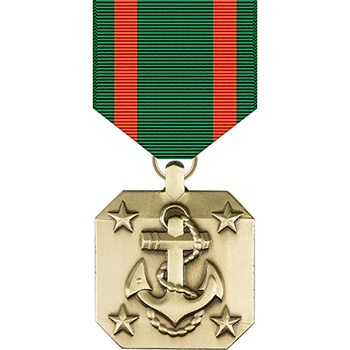
The one medal “I’d keep for life” is that Navy / MC Achievement Medal because a young man and his family who got so sick and tired of the communist life in Cuba, who dared to risk it all [life and limb] to find the very thing we take for granted here in America and that’s our freedom and liberty!
This brave teenager; mom, dad, sister, another brother, aunt, and two uncles = 8 had the intestinal fortitude, the guts, the tenacity to cross a land filled with mines of all sorts and kinds, starting at the outset of the northeast gate vicinity, navigate through sharp cactus, pitch dark, no compass just seeing where light is emanating from GTMO, coupled with angry Cuban soldiers shooting, maneuvering to cut them off before reaching our fence. Where I awaited as SOG and my quick reaction squad-armed to the teeth to repel their advances and not let them kill this family as they did the last family of 11 that tried the same thing and met their fate.
So it is in this spirit I’m honored to possess this particular medal and hold it in high esteem, just like a MOH recipient would.
Which individual(s) from your time in the military stand out as having the most positive impact on you and why?
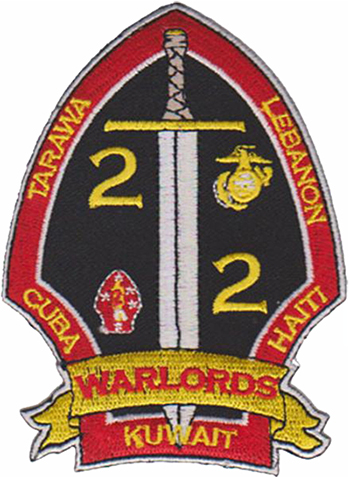
[Then] Sgt. Christopher H. Harris 2/2 (1983 – 1988) is one. This guy was so smart. He knew his job inside and out and taught others the knowledge he possessed, as any great leader would; more importantly, he was a friend. We called him “Dirty Harry” because of his propensity to stay dirty from the field even after leaving the bush. He is truly a great man, honest, sincere, true to himself! I miss him very much.
Gunny Coontz from MCSF Training Center-CO. Gunny. He is a true professional, hilarious. He took good care of us junior Marines, and he cared about every aspect of the training center daily. He never took himself so seriously as other stuck-up staff NCOs I’ve met along the way. He’s reachable, extended himself, gone out of his way for his Marines so long as you were right and honorable, and even if you messed up, he still encouraged you. After graduating from NCO school in Quantico, he visited me, and I appreciated that a lot.
List the names of old friends you served with, at which locations, and recount what you remember most about them. Indicate those you are already in touch with and those you would like to make contact with.
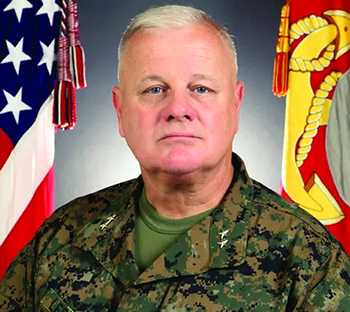
[Then] Sgt. Chris Harris USMC [now Retired?]. I want to thank him for being a good friend to me, who help me immensely. He wasn’t a fake and wasn’t a phony-he was the real deal as a man, person, Marine could be. He was greatly admired, whether people cared to admit that or not. He’s a humble man from Wyoming!
GySgt Coontz from MCSF Training Center, Chesapeake, VA [now TRNG. Co.] another real deal person. Gunny cared very much for his Marines; he always looked after their [our] welfare; even if you did wrong or made a mistake, he still encouraged you.
Maj Sessis, our illustrious leader and CO. I was his chauffeur, his Color Sgt. He gave me such great responsibility, and that was to take care of his training center. To keep everything, the trailers at that time, the grounds, and $1.5 million worth of US Gov’t property and assets; vehicles, inventory, accts. receivable, accts. payable. Whatever came into the Training Center that would enhance our physical appearance until the concrete building was erected, I had a hand on it on his behalf. He trusted me like no other in my entire career! I’m so grateful for the opportunity to serve under him and the training center and our Marines at the time.
L/Cpl Robert O’Toole and Cpl Barba-Marine Barracks, Naval Weapons Station Earle, NJ. My contemporaries at the time, fresh Marines, on our first duty station [1981]. We had a blast at Earle, pulling guard duty, guarding Nuclear Weapons. On our weekends off, O’Toole would drive me to NYC so that I could head home to Yonkers. Our squad won the first-ever “Super Squad” base competition.
Reunions on that base are ongoing, and I can’t wait to attend one, hopefully, this year.
[Then Capt. Paul Lefebvre] now Brigadier General-Retired. He is one of the most intelligent officers I’ve ever known, a Leftwich Trophy recipient for outstanding leadership, and rightfully so. He grilled tactics and strategies to overcome anyone trying to possibly steal a WMD from us.
He gave me kudos for very accurate machine-gun fire on a target while training.
Can you recount a particular incident from your service, which may or may not have been funny at the time, but still makes you laugh?
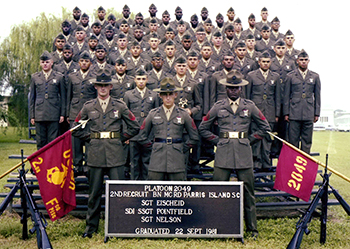
My Drill Instructor in Boot Camp, Parris Island, SC Platoon 2049. Sgt. When he spoke or got excited, Eischeid’s body would move back and forth, causing what looked like a swing. 2049 could not stop laughing sometimes, and God forbid you did anything wrong to get him to swing either in anger or just pure frustration for not following orders. Boot camp was semi-fun-lol.
What profession did you follow after your military service, and what are you doing now? If you are currently serving, what is your present occupational specialty?
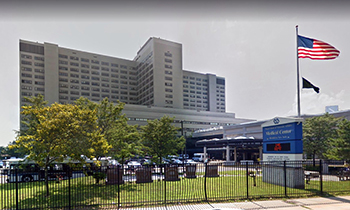
After I got out, I ran my own handyman company for a couple of years, and I worked in a Japanese company that made compressors for refrigerators.
Now I’m working in the VA hospital in Bronx-New York City, in the Mail Center. I also live here in NYC-the city that never sleeps.
What military associations are you a member of, if any? What specific benefits do you derive from your memberships?
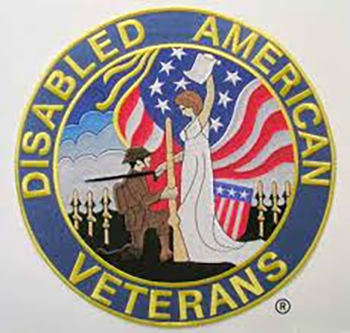
I used to be a member of the local VFW in Sweetwater, TN, but I resigned in protest due to a lack of respect and consideration for us “non-Vietnam or Korea veterans” we were treated less than because we did not go to war for which we could not empathize. Sad but true.
The DAV is helping me with existing VA claims for benefits.
In what ways has serving in the military influenced the way you have approached your life and your career? What do you miss most about your time in the service?
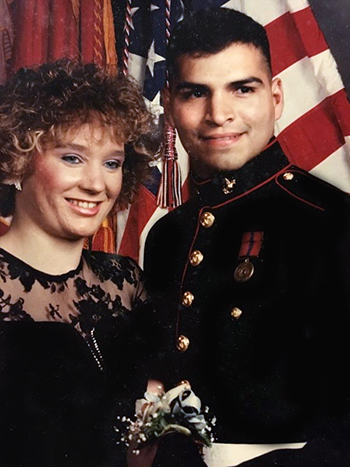
We take with us a sense of fierce pride in what we do; patriotism is another love for the country we serve. I do things with perfection, as close as humanly possible to doing it right the first time and doing it well.
I leave the places I visit better than the way I found them, so the next person [family] would have a clean table or chair or room-whatever it may be.
I miss the camaraderie, the teamwork, the pride we take in ourselves, and the things we do. Many civilians still don’t understand that concept.
Honoring the flag of this great country instead of dishonoring it through protest, burning, etc., what a slap in our faces!
Based on your own experiences, what advice would you give to those who have recently joined the Marine Corps?
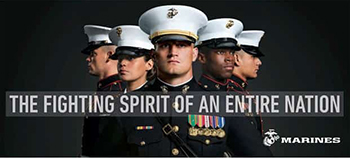
I made myself known in my unit to volunteer for every crappy job: standing fire watch, guarding ammo, supplies, etc., in the cold, or on hot summer days, at night. It didn’t matter, but I was seen and honored for those things and got promoted faster than many.
So I would encourage Marines today to go outside the box, volunteer, and pursue a higher degree than an HS diploma.
Read as many books as possible-Sgt. Harris 2/2 taught me that one.
In what ways has TogetherWeServed.com helped you remember your military service and the friends you served with.
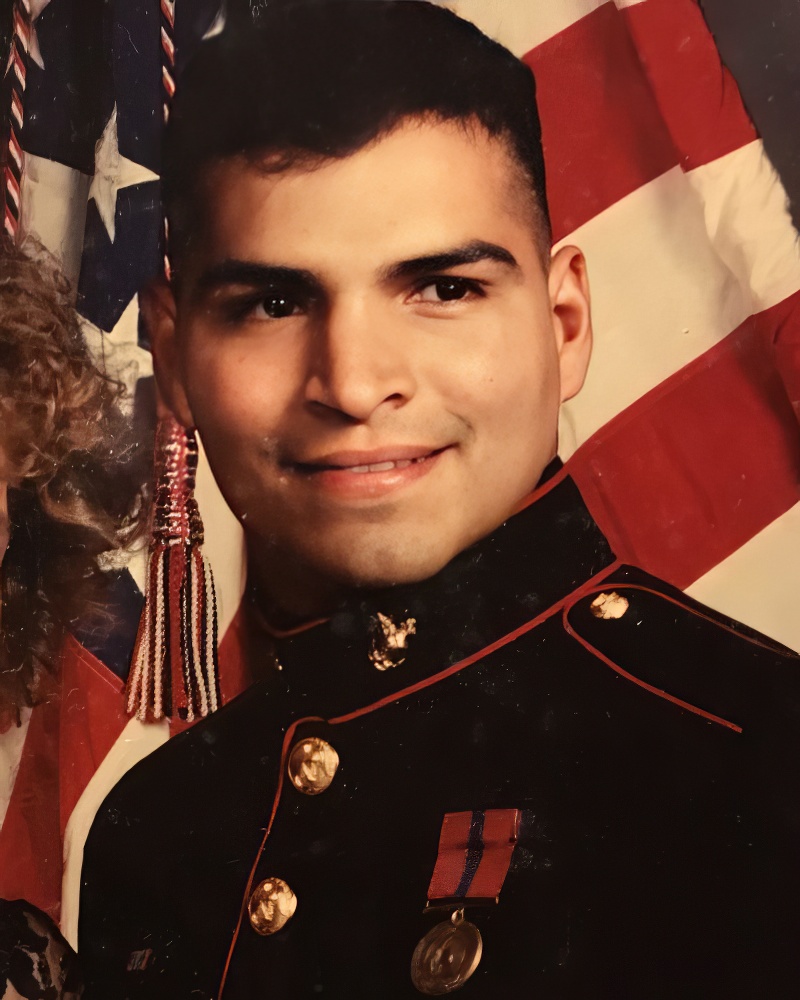
Connection. People [Marines] who may or may not still be alive. I’m 57 yrs./o. I live with chronic disease due to Camp Lejeune Contaminated Water.
I don’t know how much time I have left, but whatever I have left, I want to thank people who have helped me along the way, who were real friends to me, who gave me the time of day, and to them, I say thank you and may God richly bless you [and your family] if you have one!!!
PRESERVE YOUR OWN SERVICE MEMORIES!
Boot Camp, Units, Combat Operations
Join Togetherweserved.com to Create a Legacy of Your Service
U.S. Marine Corps, U.S. Navy, U.S. Air Force, U.S. Army, U.S. Coast Guard
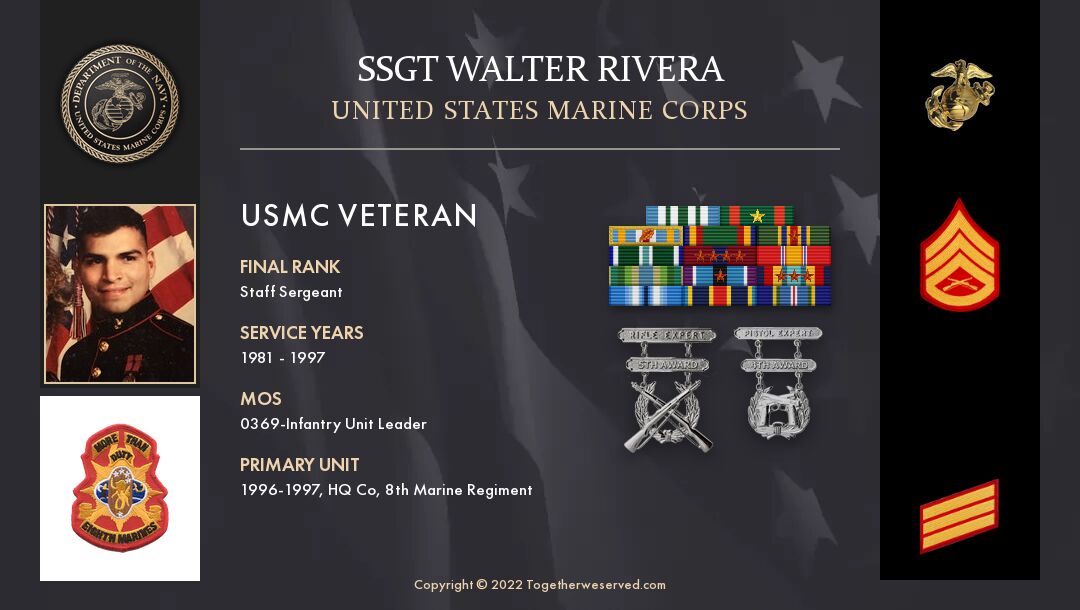
0 Comments